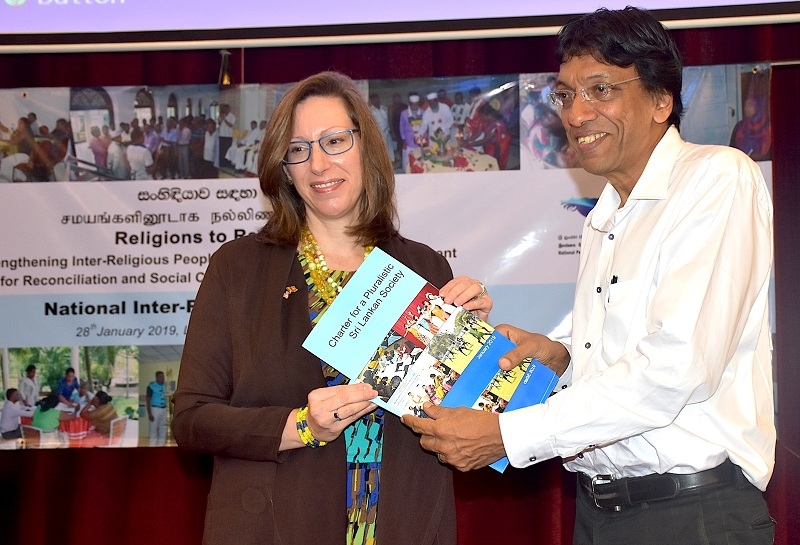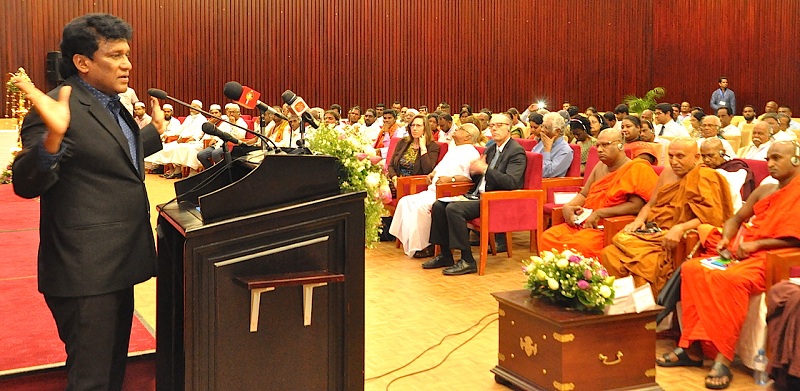Over 200 religious leaders, community leaders, persons with disabilities, local politicians, women, youth and journalists attended a National Inter Religious Symposium in Colombo under NPC’s project Religions to Reconcile.
The symposium was the culmination of a major initiative that saw the launch of a Pluralism Charter embodying the distillation of three years of consultations with multi religious and multi ethnic communities mobilized through work at the ground level.
The project is being implemented in the eight districts of Galle, Matara, Nuwara Eliya, Puttalam, Mannar, Kilinochchi, Mullaitivu and Ampara to reach a wider and diverse audience keeping in line with the people-to-people approach.
The project is supported by the United States Agency for International Development (USAID), which is the U.S. Government’s development agency, and implemented in partnership with Generations for Peace (GFP), an international peace building organization based in Amman, Jordan.
The overall goal is to strengthen community networks mentored by religious leaders and engage them in building consensus for transitional justice and a pluralistic identity.
US Ambassador Alaina Teplitz said NPC’s efforts to bring together multi religious and multi ethnic communities were vital for building understanding and tolerance and to achieving a peaceful and prosperous future.
“As role models for others, I believe your successes encourage people to reflect on their own beliefs and their own actions and their own values, and that this will hopefully lead to an even more peaceful and inclusive Sri Lanka in the future and help stand as a global model for reconciliation,” Ms Teplitz said.
Minister of National Integration, Official Languages, Social Progress and Hindu Religious Affairs, Mano Ganesan, stressed that in order for Sri Lanka to prosper, the pluralistic nature of the country must be recognised.
While everyone had his or her own identity that should be preserved, a Sri Lankan identity was also necessary, he added.
“When extremists from the north and the south speak out, they score marks. They are trying to break the country, we will have to mend it,” Mr Ganesan said.
NPC’s executive Director Dr Jehan Perera said the project had reached a large number of people who received the message that Sri Lanka was a pluralistic and multi religious country.
“However this does not mean that we have lost our identity. We all have our own religion and culture to be practiced within the rule of law and universally recognised human rights,” Dr Perera said.
Sarvodaya Founder Dr A. T. Ariyaratne advocated a change in the system to build a new nation under a new leadership where everyone had equal rights. “We have to find an alternative economic, political and social system, otherwise we have no future.”
During the symposium representatives from the eight districts covered by the project described how interventions and activities by the DIRCs had helped to ease religious and ethnic conflicts in their areas and prevented them from escalating into violence.
They also related how exchange visits from north to south had enabled them to share problems and experiences and to understand each other’s cultures and religions.
Recommendations of the Pluralism Charter:
- Political leaders and State officials have a key role to play in building a pluralistic society in which there is equal voice irrespective of number and in which members of diverse ethnic, racial, religious, or social groups maintain and develop their traditional culture or special interest within the sphere of a common citizenship.
- It is important that the state acts with justice and equity at all times in serving the people.
- Religious leaders have a key role to play in embedding the concept of pluralism in the larger community. They necessarily need to be trained in the idea of pluralism so that they in turn can share their learning through the lens of social cohesion and religious coexistence.
- Review existing laws and introduce necessary amendments in alignment with pluralistic values.
- Minimise regressive provisions in traditional laws, aligning them with accepted fundamental principles, international standards and provisions in the Constitution.
- All provisions in the Constitution for power sharing should be implemented in full without favour to any particular religion/ community or region.
- Ensuring equity in the distribution of resources and equality in delivering services – all State services including police, health, education etc.
- Strengthening Independent Commissions established through the 19th Amendment to the Constitution to ensure that the public sector acts without fear or favour.
- The State should create sufficient awareness concerning the powers and functions of the Independent Commissions among State officials, the private sector and members of the public to maximise their effectiveness and create the environment necessary for them to function freely.
- The State should create sufficient awareness on laws and policies that relate to the protection of ethnic identities, diversity and the administration of justice, among State officials, the private sector and members of the public to ensure that fundamental freedoms are upheld.
- Ensuring there are adequate legal frameworks at district and provincial level to enable the sharing of marine resources, drinking water, and land equitably across populations.
- All ethnicities should enjoy freedom of expression equally. It is especially important that equal space is ensured in mainstream discourse.
- Sufficient laws should be introduced to bar hate speech or expression inciting violence against a particular group or community. Article 14(1) (a) of Chapter 3 of the Constitution guarantees the right to free speech and expression. However, if it is to be enjoyed in the intended spirit of the provision, it is necessary for the State to ensure safe space.
- Punish all politicians, religious leaders or any other groups or individuals inciting religious and/ or ethnic hate, without exception.
- Legal action against hate speech should be swift and adequate. Social media has become a principal source of information for the public. There is both positive and negative aspects to the role of social media as a primary news and information platform.
- The State should ensure that all media hold to principles of objectivity in disseminating news and information. The public should also be made aware to consider news and information with sufficient critical evaluation.
- The State should adopt an effective process to identify and proscribe political parties or organisations that promote divisions along religion or race.
- Early warning mechanisms should be a necessary element of government and administration to pre-empt possible conflict and to proactively deal with problems. The existing practice of the Sri Lankan State is reactive where action is taken once the problem has grown to the point of tension or conflict. The State leadership, policymakers and State institutions should be trained in the use of the early warning tool.
- Including pluralism in the school curriculum. It is necessary for Sri Lankans to understand the values that underpin pluralism if it is to consciously take root as an effective response to ethnic divisions.
- The State should abandon the practice of setting up education institutions on the basis of ethnicity or religion, which vitiates efforts to create a more engaged, cohesive and reconciled society.
- The State should necessarily educate the public on the values and cultural practices of all communities and the need to respect diversity.
- Elevating the Police service to be more sensitised and effective in the performance of its duties. The Police force should have sufficient awareness of the cultural practices and sensitivities of the communities that it serves and also the ability to communicate in Sinhala or Tamil, as necessary. The police force should be sufficiently diverse, in its ethnic composition to serve all populations equally.
- The State should make it compulsory for all Sri Lankan citizens to learn Sinhala and Tamil. It should be ensured that the language skill is of sufficient functionality to serve meaningfully, in the search for pluralistic reconciliation.
- Recruiting trilingual – Sinhala, Tamil and English, officers to the health sector to ensure an effective service. This falls within the broader category of deficiencies in the implementation of the Official Languages Policy. Part of the action to remedy this would be the recruitment of doctor/ patient-interpreters locally.
- Adopting special mechanisms to include youth in the country’s development process. Youth were the primary victims of the insurgencies of 1971-72, 1987-1990 and the ethnic war from 1980-2009. There is a need to include youth through an equitable process that takes into account education and skills.
- Affirmative action should be taken in terms of Article 12(4) of Chapter 3 of the Constitution to empower those with special needs. There should be adequate provisions to include matters particular to them in development plans at sub national level – provincial and district.
- Adequate resources should be provided to enable persons with special needs to fulfil their basic needs. Institutions should be established at district/ provincial level to strengthen education, health and welfare services to these sectors. A special cadre of trained officers should be introduced to support this community.


